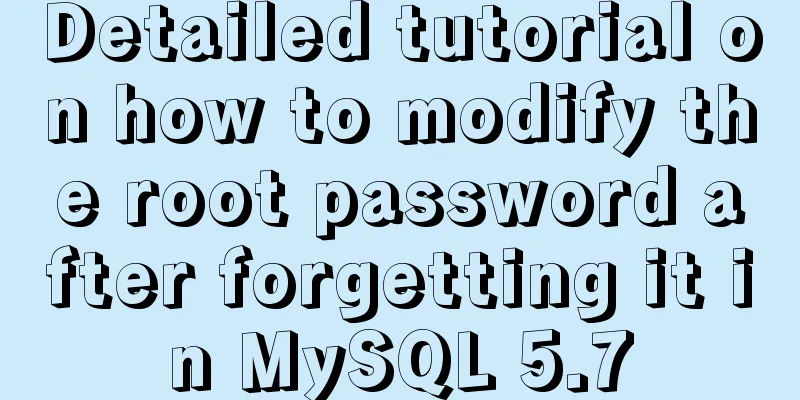Detailed tutorial on how to modify the root password after forgetting it in MySQL 5.7

|
Preface For a long time, the application and learning environment of MySQL has been MySQL 5.6 and earlier versions, and no attention has been paid to the changes and new features of the new version MySQL 5.7. Today, when I was helping someone deal with a forgotten root password, I found that the previous method didn't work. The specific situation is as follows: The case environment is as follows: Operating system: Red Hat Enterprise Linux Server release 6.6 (Santiago) Database version: 5.7.18 MySQL Community Server (GPL) Forgot your password? When you enter an incorrect password, you will get the following error message: [root@mytestlnx02 ~]# mysql -u root -p Enter password: ERROR 1045 (28000): Access denied for user 'root'@'localhost' (using password: YES) [root@mytestlnx02 ~]# Check whether the MySQL service is started. If it is started, shut down the MySQL service. [root@mytestlnx02 ~]# ps -ef | grep -i mysql root 22972 1 0 14:18 pts/0 00:00:00 /bin/sh /usr/bin/mysqld_safe --datadir=/var/lib/mysql --socket=/var/lib/mysql/mysql.sock --pid-file=/var/run/mysqld/mysqld.pid --basedir=/usr --user=mysql mysql 23166 22972 0 14:18 pts/0 00:00:00 /usr/sbin/mysqld --basedir=/usr --datadir=/var/lib/mysql --plugin-dir=/usr/lib/mysql/plugin --user=mysql --log-error=/var/log/mysqld.log --pid-file=/var/run/mysqld/mysqld.pid --socket=/var/lib/mysql/mysql.sock root 23237 21825 0 14:22 pts/0 00:00:00 grep -i mysql [root@mytestlnx02 ~]# service mysqld stop Stopping mysqld: [ OK ] [root@mytestlnx02 ~]# Find the MySQL my.cnf configuration file and add the following information to /etc/my.cnf (some versions are /etc/mysql/my.cnf): [mysqld] skip-grant-tables Then I started MySQL and entered MySQL, and changed the root password. During the operation, I encountered The specific operation process is as follows:
[root@mytestlnx02 ~]# service mysqld start
Starting mysqld: [ OK ]
[root@mytestlnx02 ~]# mysql -u root
Welcome to the MySQL monitor. Commands end with ; or \g.
Your MySQL connection id is 4
Server version: 5.7.18 MySQL Community Server (GPL)
Copyright (c) 2000, 2017, Oracle and/or its affiliates. All rights reserved.
Oracle is a registered trademark of Oracle Corporation and/or its
affiliates. Other names may be trademarks of their respective
owners.
Type 'help;' or '\h' for help. Type '\c' to clear the current input statement.
mysql> use mysql;
Reading table information for completion of table and column names
You can turn off this feature to get a quicker startup with -A
Database changed
mysql> update user set password=PASSWORD('Kd8k&dfdl023')
-> where user='root';
ERROR 1054 (42S22): Unknown column 'password' in 'field list'
mysql> update mysql.user set authentication_string=password('Kd8k&dfdl023') where user='root';
Query OK, 1 row affected, 1 warning (0.00 sec)
Rows matched: 1 Changed: 1 Warnings: 1
mysql> flush privileges;
Query OK, 0 rows affected (0.00 sec)
mysql> exit
In the my.cnf file, comment or delete the line "skip-grant-tables" that you just added. Then after restarting the MySQL service, you need to execute the command
[root@mytestlnx02 ~]# service mysqld start
Starting mysqld: [ OK ]
[root@mytestlnx02 ~]# mysql -u root -p
Enter password:
Welcome to the MySQL monitor. Commands end with ; or \g.
Your MySQL connection id is 4
Server version: 5.7.18
Copyright (c) 2000, 2017, Oracle and/or its affiliates. All rights reserved.
Oracle is a registered trademark of Oracle Corporation and/or its
affiliates. Other names may be trademarks of their respective
owners.
Type 'help;' or '\h' for help. Type '\c' to clear the current input statement.
mysql> use mysql;
ERROR 1820 (HY000): You must reset your password using ALTER USER statement before executing this statement.
mysql> set password=password('Kd8k&dfdl023');
Query OK, 0 rows affected, 1 warning (0.00 sec)After checking some relevant information, I found that MySQL 5.7 has some new features in terms of security. 1. The plugin field of the user table mysql.user is not allowed to be empty. The default value is mysql_native_password instead of mysql_old_password. The old password format is no longer supported.
2. Add a password expiration mechanism. After the expiration, you need to change the password, otherwise it may be disabled or enter sandbox mode. Whether to enable password expiration is controlled by the parameter default_password_lifetime. mysql> show variables like 'default_password_lifetime'; +---------------------------+-------+ | Variable_name | Value | +---------------------------+-------+ | default_password_lifetime | 0 | +---------------------------+-------+ 1 row in set (0.00 sec) mysql> 3: Added password security level and password complexity settings. The parameters are as follows: mysql> show variables like 'validate_password%'; +--------------------------------------+--------+ | Variable_name | Value | +--------------------------------------+--------+ | validate_password_check_user_name | OFF | | validate_password_dictionary_file | | | validate_password_length | 8 | | validate_password_mixed_case_count | 1 | | validate_password_number_count | 1 | | validate_password_policy | MEDIUM | | validate_password_special_char_count | 1 | +--------------------------------------+--------+ 7 rows in set (0.00 sec) 4. When using mysql_install_db to initialize, a random password is automatically generated by default and placed in /var/log/mysqld.log. No other accounts except root@localhost and mysql.sys@localhost are created, and no test library is created.
[root@mytestlnx02 mysql]# yum localinstall mysql-community-{server,client,common,libs}-*
[root@mytestlnx02 mysql]# rpm -qa | grep -i mysql
mysql-community-client-5.7.18-1.el6.i686
mysql-community-libs-5.7.18-1.el6.i686
perl-DBD-MySQL-4.013-3.el6.x86_64
mysql-community-server-5.7.18-1.el6.i686
mysql-community-common-5.7.18-1.el6.i686
mysql-community-libs-compat-5.7.18-1.el6.i686
[root@mytestlnx02 mysql]# service mysqld start
Initializing MySQL database: [ OK ]
Installing validate password plugin: [ OK ]
Starting mysqld: [ OK ]
[root@mytestlnx02 mysql]#
[root@mytestlnx02 mysql]# grep 'temporary password' /var/log/mysqld.log
2017-05-05T06:10:57.802143Z 1 [Note] A temporary password is generated for root@localhost: w99s(m-q_ML:
mysql> select user ,host from user;
+-----------+-----------+
| user | host |
+-----------+-----------+
| mysql.sys | localhost |
| root | localhost |
+-----------+-----------+
2 rows in set (0.00 sec)Summarize The above is the full content of this article. I hope that the content of this article can bring some help to your study or work. If you have any questions, you can leave a message to communicate. Thank you for your support of 123WORDPRESS.COM. You may also be interested in:
|
<<: Detailed graphic tutorial on silent installation of oracle12.2 on CentOS under VMware
>>: Complete steps for using Echarts and sub-packaging in WeChat Mini Program
Recommend
Pure CSS custom multi-line ellipsis problem (from principle to implementation)
How to display text overflow? What are your needs...
Vue uniapp realizes the segmenter effect
This article shares the specific code of vue unia...
Vue+openlayer5 method to get the coordinates of the current mouse slide
Preface: How to get the coordinates of the curren...
An article to give you a deep understanding of Mysql triggers
Table of contents 1. When inserting or modifying ...
Detailed explanation of axios encapsulation and API interface management in React project
Table of contents Preface Install Introduction Sw...
How to communicate between WIN10 system and Docker internal container IP
1. After installing the Windows version of Docker...
Detailed explanation of the solution to the problem of nohup log output being too large under Linux
Recently, I ran a spark streaming program in a ha...
Analyze Mysql transactions and data consistency processing issues
This article analyzes the consistency processing ...
Detailed analysis of the chmod command to modify file permissions under Linux
Use the Linux chmod command to control who can ac...
How to effectively compress images using JS
Table of contents Preface Conversion relationship...
MySQL 8.0.17 installation and configuration method graphic tutorial
This article shares the installation and configur...
How to run top command in batch mode
top command is the best command that everyone is ...
Summary of the use of vue Watch and Computed
Table of contents 01. Listener watch (1) Function...
MySQL multi-table join introductory tutorial
Connections can be used to query, update, and est...
MySQL 5.7.21 installation and configuration method graphic tutorial (window)
Install mysql5.7.21 in the window environment. Th...











